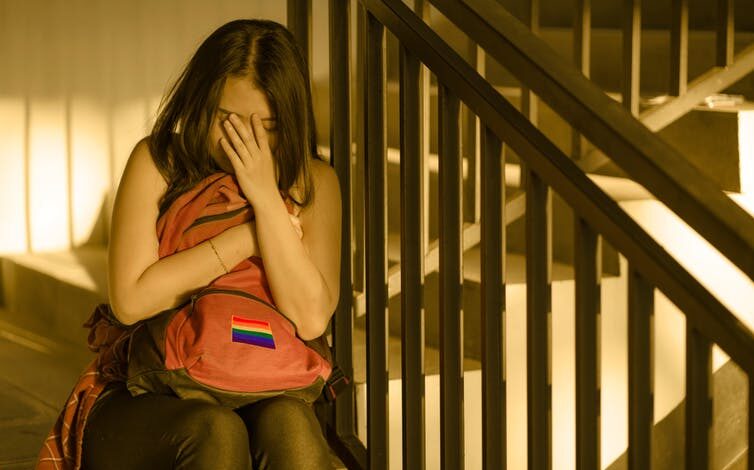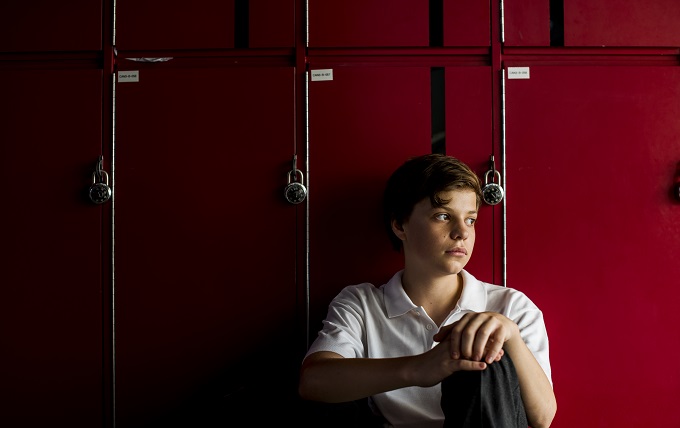Schools can still expel LGBTQ+ kids. The Religious Discrimination Bill only makes it worse

The Religious Discrimination Bill is back, this time in its third iteration.
The Coalition party room unanimously endorsed the bill on Tuesday, but a number of Liberal MPs voiced concerns about what it could mean for LGBTQ+ students and teachers at faith-based schools and universities.
Attorney General Michaelia Cash has said no child should be “suspended or expelled from school on the basis of their sexuality or gender identity”, and that discrimination against students is “unacceptable”.
However, the bill does nothing to protect LGBTQ+ students and teachers. It allows more, not less, discrimination by religious schools.
The prime minister’s long lost ‘promise’
In October 2018, the Prime Minister promised to ban religious schools from expelling students on the basis of their sexuality.
This requires removing the exemptions in the federal Sex Discrimination Act which permit religious schools to expel LGBTQ+ students and sack LGBTQ+ teachers. The reason can be as simple as “they’re bisexual”, or “they’re transgender” – as long as this fits within the school’s religious beliefs.
More than three years later, these exemptions still remain. Religious schools can, today, expel kids just for being gay. While many might not choose to do this and are supportive of the LGBTQ+ community, there have still been cases of non-supportive religious schools who have sacked teachers for being gay.
Despite this, the federal government has continually kicked the can down the road on this reform.
Michaelia Cash last week asked the Australian Law Reform Commission to provide detailed advice on the Sex Discrimination Act exemptions. This comes some 30 months after the Commission was first asked to conduct an inquiry into this issue.
But here’s the kicker – they can only report back 12 months after the Religious Discrimination Bill becomes law.
At best, this is likely to be early 2023, since the Religious Discrimination Bill seems destined to head to a Senate inquiry. An entirely new law will then need to be drafted and passed through parliament to change the Sex Discrimination Act exemptions.
The best-case scenario is that religious schools lose the right to sack LGBTQ+ staff and expel LGBTQ+ students in, wait for it… 2024. A student who was in year 7 when this change was promised will have graduated from high school by the time it is implemented.
And even then, if only suspension and expulsion were banned – the attorney general only promised to address these two outcomes – this wouldn’t stop religious schools mistreating LGBTQ+ students in other ways. Schools could still ban same-sex relationships, or refuse to use a transgender student’s pronouns.
So what does the Religious Discrimination Bill have to say about it?
If the Sex Discrimination Act exemptions are eventually removed, that still isn’t the end of the story.
Federal Labor has expressed concern at how the Religious Discrimination Bill may adversely affect LGBTQ+ students and teachers at religious schools. Their concern is well founded.
The bill’s main purpose is to prohibit discrimination on the basis of religious belief or activity. This means, for example, that an employer would not be able to sack someone on the basis they are Jewish, or Muslim.
However the bill also contains very wide exemptions. These are situations in which discrimination is allowed.
Religious schools are permitted to discriminate on the basis of a person’s religion. They only need to prove that an individual of the same religion as the school “could reasonably consider” the school’s actions to accord with their religious beliefs.
It is a test not seen in any other Australian discrimination laws. It is such a low bar that religious schools can likely rely on it for almost everything they do.
This means that even if the Sex Discrimination Act exemptions are removed, the Religious Discrimination Bill could provide an alternative route for religious schools to discriminate against LGBTQ+ teachers and students.
For instance, a non-supportive religious school may teach that gay couples should not be allowed to marry or have children. They could then discriminate against any staff and students who do not adhere to this belief – such as a teacher who marries their same-sex partner.
To partly address this, the government added a clarification in the second draft of the bill that it “does not” permit conduct that is unlawful under the Sex Discrimination Act.
However, the third draft of the Bill has watered this down. It now simply says that conduct covered by the bill “may” still be discriminatory under the Sex Discrimination Act. The subtle change from “does not” to “may” makes a big difference, and puts LGBTQ+ teachers and students at risk.
And because of the controversial “statement of belief” provisions in the bill, religious schools are largely free to tell trans students that their gender identity is against the laws of God, or to tell lesbian parents they are evil for depriving their child of a father. Even if other discrimination laws ban such statements being made, this bill overrides them.
No matter how you cut it, the Religious Discrimination Bill permits far too much harm in the name of religion.
Oh, and one more thing…
As if this wasn’t enough, the latest version of the bill adds a second override provision.
This allows religious schools to hire and fire on the basis of any religious views, even where such views are irrelevant to the position in question. The school only needs to share publicly their policy on this.
Although some state and territory laws provide stronger protection for staff at religious schools, the bill overrides these laws.
Victoria, for instance, is considering a new law which would bar religious schools from employment discrimination except for key faith-based roles, such as religious education teachers. It would mean religion cannot be used to discriminate against maths teachers, or gardeners.
This new provision in the Religious Discrimination Bill would reverse that protection, and open up Victorian teachers and staff to discrimination.
In the last 40 years of discrimination laws in Australia, there is hardly a single example of a federal law overriding discrimination protections granted under state and territory laws. In this Bill, there are two: both with severe consequences for the LGBTQ+ community.
Unless the Morrison government takes swift action to correct this course, being an LGBTQ+ student or staff member at a non-supportive religious school is going to become even harder than it already is.![]()







